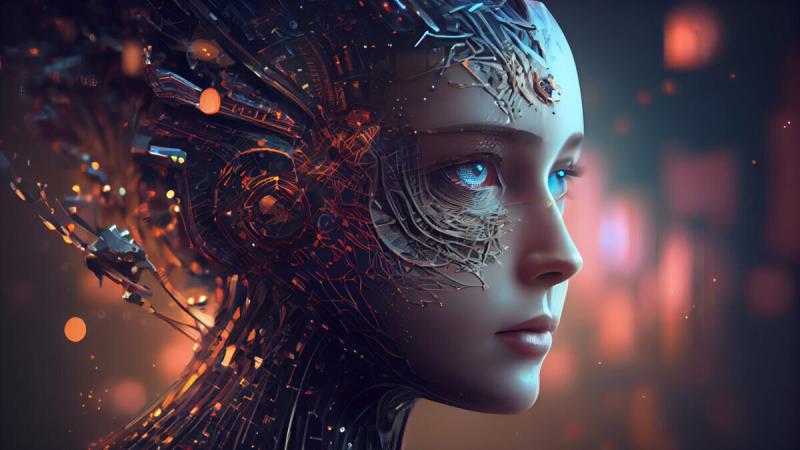The Rise of AI in Film Making: A New Era of Creativity

Artificial intelligence (AI) is changing the film industry, which is renowned for its ability to adjust to new technologies. Filmmakers are devising creative methods to use AI to improve their work as technology continues to develop at an unprecedented rate.
This shift ushers in a new era of filmmaking, where the best AI laptops assist with everything from scriptwriting to post-production. In July 2023, a survey on the application of AI in the film and television industries was conducted in the United States.
According to the study, 42% of participants are in favor of using AI in movies to alter actors' looks and create amazing effects. In addition, 38% of respondents are in favor of using AI to create the voices of animated characters.
If you want to learn more about the rise of AI in film marketing, read this article.
The Role of AI in Filmmaking
The effects of AI on filmmaking are noticeable in several domains, including post-production and scriptwriting. These modern technologies are democratizing the filmmaking process by providing independent filmmakers access to resources previously only available for expensive productions.

1. Post-production and Editing
AI PCs are transforming post-production editing by automating activities that often require weeks, such as merging sequences, making transitions, and choosing the best footage.
- It can quickly handle intricate changes, freeing editors to concentrate on original ideas rather than tedious work.
- It can also improve sound design, enabling producers to separate singers from recordings with a lot of noise, modify ambient sound for realistic effects, and construct 3D soundscapes.
AI technologies can minimize audio flaws in live recordings and documentaries, speeding up and reducing the amount of work required for post-production.
2. Visual Effects and Animation
Artificial intelligence is revolutionizing animation and visual effects (VFX). AI-powered tools can now automate rotoscoping, greatly reducing the time needed to complete this task. These tools utilize machine learning algorithms that can intelligently monitor and distinguish objects from their backdrop.
It can even create lifelike CGI figures ( Computer Generated Imagery). It speeds up the production process and gives the director more creative freedom to develop the visuals for their story.
In Jon Favreau's 2019 Disney film The Lion King, artificial intelligence was essential to producing lifelike animal characters and settings. The AI animation tools increased the possibilities for visual narrative by facilitating a seamless transition between computer-generated imagery and real-world photography.
3. Scriptwriting and Analysis
Choosing the right script is essential to the film's success and financial success. As a result, filmmakers can now use AI to create original scripts. Machine learning algorithms help interpret movie screenplay data and generate original scripts when it is fed into AI models.
This makes filmmaking much easier and requires fewer resources. AI can also evaluate hundreds of scripts using Deep Learning technology to determine if they are likely to succeed or fail. This feature enables screenwriters to enhance their scripts, thereby enabling producers to make more informed choices.
4. Storyboarding and Visualization
AI computers have made it possible for filmmakers to create realistic animations and digital storyboards, which are essential for pre-visualization. AI-driven technologies can build digital storyboards from initial concepts that depict scenarios, lighting, and camera angles before any on-set filming.
AI-generated 3D environments also save time and money by enabling filmmakers to test various setups and scout virtual places.
This feature is essential for films with elaborate or fantastical settings because it enables production designers and filmmakers to test scenes without being constrained by actual space.
5. Casting and Character Development
AI helps in casting, enabling directors to locate talent matching specific character profiles by searching actor databases for traits.
For instance, sophisticated algorithms assisted in producing realistic facial emotions and motion for the AI character Ava in Ex Machina.
These artificial intelligence-generated characters give movies a more realistic feel while enabling performers to play roles more accurately and pave the way for entirely digital characters in the future with complex, AI-driven personalities.
Benefits of AI in Filmmaking
There are several benefits of using AI in filmmaking.
- First, some options are more imaginative. AI opens up new creative possibilities for visual and narrative creation.
- Second, AI has the potential to drastically cut down on the time and expense of several production phases, including editing and visual effects.
- Third, AI is driving the industry's transition to data-driven decision-making.
Final Thoughts
Striking a balance between technological innovation and human creativity is essential to maximizing AI's potential in filmmaking. AI laptops and PCs are revolutionizing the movie industry by increasing creativity, cutting expenses, and shortening production times.
Therefore, instead of replacing human contribution, filmmakers are exploring ways to use AI as a collaborative tool that enhances it. AI provides advanced visualization tools and automates tedious processes, freeing up filmmakers to concentrate on creating stories and trying out new approaches.
Comments